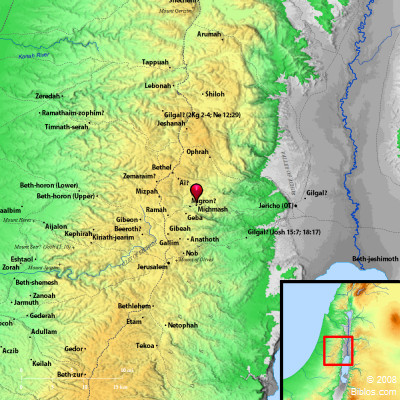Atlas  Michmash and surrounding region Maps Created using Biblemapper 3.0 Additional data from OpenBible.info You are free to use up to 50 Biblos coprighted maps (small or large) for your website or presentation. Please credit Biblos.com. Occurrences 1 Samuel 13:2 Saul chose him three thousand men of Israel, of which two thousand were with Saul in Michmash and in the Mount of Bethel, and one thousand were with Jonathan in Gibeah of Benjamin: and the rest of the people he sent every man to his tent.1 Samuel 13:5 The Philistines assembled themselves together to fight with Israel, thirty thousand chariots, and six thousand horsemen, and people as the sand which is on the seashore in multitude: and they came up, and encamped in Michmash, eastward of Beth Aven. 1 Samuel 13:11 Samuel said, "What have you done?" Saul said, "Because I saw that the people were scattered from me, and that you didn't come within the days appointed, and that the Philistines assembled themselves together at Michmash; 1 Samuel 13:16 Saul, and Jonathan his son, and the people who were present with them, abode in Geba of Benjamin: but the Philistines encamped in Michmash. 1 Samuel 13:23 The garrison of the Philistines went out to the pass of Michmash. 1 Samuel 14:5 The one crag rose up on the north in front of Michmash, and the other on the south in front of Geba. 1 Samuel 14:31 They struck of the Philistines that day from Michmash to Aijalon. The people were very faint; Nehemiah 11:31 The children of Benjamin also lived from Geba onward, at Michmash and Aija, and at Bethel and its towns, Isaiah 10:28 He has come to Aiath. He has passed through Migron. At Michmash he stores his baggage. Encyclopedia MICHMASHmik'-mash (mikhmash; Machmas): A town in the territory of Benjamin, apparently not of sufficient importance to secure mention in the list of cities given in Joshua 18:21;. It first appears as occupied by Saul with 2,000 men, when Jonathan, advancing from Gibeah, smote the Philistine garrison in Geba (1 Samuel 13:2). To avenge this injury, the Philistines came up in force and pitched in Michmash (1 Samuel 13:5). Saul and Jonathan with 600 men held Geba, which had been taken from the Philistine garrison (1 Samuel 13:16). It will assist in making clear the narrative if, at this point, the natural features of the place are described. MICHMASH, now Mukmas, 1990 ft. above the Mediterranean, 7 ms. n. of Jerusalem, now a village with ruins, on n. bank of a deep torrent bed and not far off are the rocky cliffs of Bozez and Seneh, though not certainly located. 1 Sam. 14:4. Strong's Hebrew H4363: Mikmas or Mikmash or Mikmasha city in Benjamin |



